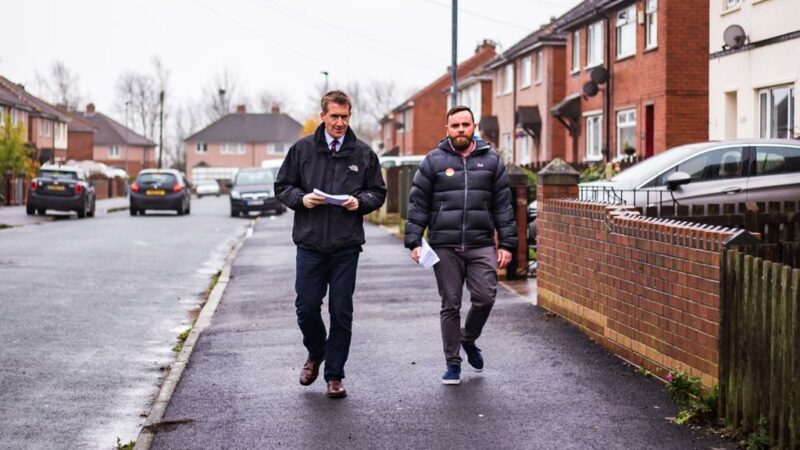
Barnsley is often used as an example of a ‘Labour heartland’ seat. Our party was once woven into the social fabric of our community, but pride in Labour has now in many cases been replaced with apathy and antipathy.
The truth is that the origin of this bruising general election defeat wasn’t just Jeremy Corbyn winning the leadership or the UK voting to leave the European Union. However, a combination of the two meant the slow decline of support in our traditional base was accelerated and produced Labour’s worst election performance in more than 80 years.
In my constituency of Barnsley Central, the Brexit Party came a worryingly close second. They threw the kitchen sink at us – visits from Nigel Farage with national media entourage in tow, a full wraparound our local paper, a plane flying a party banner, a dozen mailings to households, publicity across the borough and countless targeted Facebook ads.
All of which carried the same message: Labour doesn’t care about you. And it worked. The result was a humbling night for Labour in Barnsley. I received 10,000 fewer votes and saw my majority reduced to 3,571. Nearly one in three people – in the town still home to the National Union of Mineworkers – supported a political outfit headed by a man who once said he “supported Thatcher’s reforms of the economy”.
Our victory in Barnsley was ultimately down to all of those who knocked on door after door in the bitter cold and never-ending rain. I will forever be in their debt. They rolled up their sleeves and eked out the votes, house by house.
On four occasions, I was confronted by constituents displaying such visceral anger that I was prepared for a physical altercation. I count myself fortunate that it never quite reached that point. They included an ex-miner who said Labour was no longer for the working class and a veteran who said our party’s frontbench supported terrorists.
Local activists were regularly verbally abused for having the temerity to speak with residents about the election or simply deliver campaign literature. I have a duty of care for them and wrestled with whether it was fair to ask them to go out and knock on doors.
I had countless conversations with people who expressed deep concern at a Labour Party that they thought no longer spoke for them. They felt we were out of step with the values of community, patriotism and respect for our armed forces that run deep throughout our town.
The biggest obstacle faced on the doorstep was undoubtedly our party’s leadership. The disdain voters held was for a plethora of reasons, with virtually nobody believing Jeremy could be trusted to lead our country.
The second most prominent reason for our collapse was our Brexit stance. We were perceived as a party of Remainers, intent on disrespecting the democratic decision made in 2016. Nearly everyone was exhausted by the delay, uncertainty and debate around a second referendum.
Thirdly, our manifesto – while full of ambitious individual offers – was viewed by most as unrealistic. That is not to say the level and scale of change on offer is not deliverable but the groundwork preparing people for it was not laid. In the end, it cut through, but in a negative rather than positive way.
The outcome: Labour is now further away from power than at any time in living memory. Moreover, this regression has occurred nine years into one of the most incompetent and destructive governments in British political history. But this is not the time for bloodletting, ‘I told you so’ or goading.
Nothing I’ve written is intended to antagonise members who supported our party’s leader – as many did in good faith – whose solidarity and determination I relied on during this election. However, without an honest analysis of what happened and the requisite change, we risk the bond between heartland seats across the Midlands and North of England and Labour being irrevocably broken.
Our activists are knackered and worn down, but it is imperative that we now rebuild our party, regain trust and ensure it is grounded in communities around the country. The task is mammoth, yet we owe it to those towns and regions devastated by a decade of austerity who sadly felt they couldn’t support us this time.
Herein lies the tragedy. Our country has been crying out for a Labour government but we keep giving people reasons not to vote for us. With strong leadership and a credible policy offer that addresses the huge challenges we face, I am certain that we can win them back.
We need to act fast, before it’s too late. This election represented the last chance Barnsley is willing to give Labour. If we don’t listen – and change – the final bricks of what’s left of the ‘Red Wall’ will be bulldozed away next time.




More from LabourList
A year in power: The cabinet on their proudest wins and favourite moments
‘One year on, Labour still hasn’t reckoned with collapsing trust in politics’
‘I’m the Labour MP who beat Liz Truss. Here’s how the campaign to unseat her unfolded’